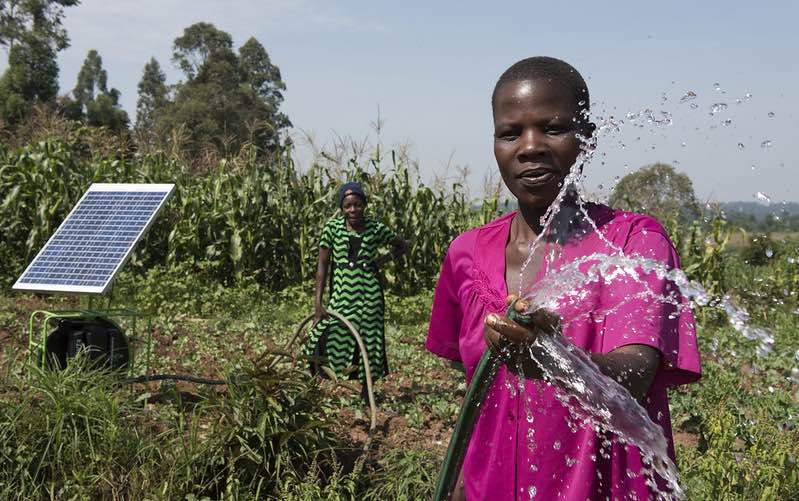Every year, global food systems produce, process, transport, and market the food and agricultural products on which the world relies. However, these same global food systems also play a big role in—and face pressures from—climate impacts, environmental damage, food insecurity and malnutrition, public health problems, and food loss and waste. To tackle these challenges, we must urgently transform food systems. True food system transformation will have to go beyond the agricultural policy reforms enacted during the past 50 years. We now need to ensure that food systems elevate and prioritize health, inclusion, sustainability, resilience, climate, and the environment. Raising awareness of the economic cost, estimated at over $10 trillion a year, of food system impacts on these other dimensions is a first step in this direction.
Existing global and national commitments, in terms of policies and financial investments, are not sufficient to guide the change required; estimates have put the cost of a comprehensive food system transformation at $500 billion every year between now and 2050. How do we, then, make the right kind of change happen, and help food systems function for the benefit of all people, and the environment?
A new publication, The Economics of the Food System Transformation, released by the Food System Economics Commission (FSEC) in Berlin on January 29, addresses this question and more.
Based on rigorous economic modeling, in-depth literature reviews and case studies, the FSEC report shows what is needed to transform today’s food systems to be inclusive, health-enhancing and environmentally sustainable. Such a food systems transformation would have astounding economic benefits, the report says: An estimated $10 trillion a year—equivalent to 8% of global GDP in 2020.
FSEC is an independent academic commission of some of the world’s leading experts on the economics of climate change, health, nutrition, agriculture, and natural resources, established to provide political and economic decision-makers with tools and evidence to move food and land-use systems towards healthy, inclusive, and environmentally sustainable futures. At last month’s launch event, the commission discussed these important research findings, policy suggestions, and pathways forward; and highlighted opportunities for global policymakers and stakeholders to help shift and transform our food systems.
The FSEC report: Highlights
For food systems transformation to occur, the report finds, there must be a shift in consumption patterns towards healthy diets. Economic incentives in agricultural and food markets should also be reset—for example by repurposing government support for agriculture and targeting revenue from new environmental taxes to support the food systems transformation. Research and development-driven innovation directed at increasing labor productivity and workers’ livelihood opportunities, especially for poorer workers in food systems, is imperative. Finally, scaling up safety nets to keep food affordable for the poorest is essential for ensuring equality and equity in food systems.
A political economy approach to food system transformation
The FSEC report is a critical contribution to getting food systems transformation off the ground. As we do so, we must also pay attention to the political economy aspects of making any big change happen. Policymakers often face political constraints and opposition for a variety of reasons. Governance structures often split responsibilities for food system reforms across different decision makers. Opposition from vested interests, mismatched horizons between policy objectives and political terms, differential political economy incentives from dispersed benefits and concentrated losses, and complexities in reconciling global objectives with local policies and other factors make reform negotiations a challenge.
There is no one-size-fits-all solution. Global food systems are interconnected and require collaboration among various stakeholders. In addition, different nutritional needs, wages, agricultural practices, food prices, availability of ingredients, and environments mean transformation will look different in each region.
To combat these problems, countries should individually formulate national food system transformation strategies, laying out how to translate global goals into local actions and harmonize national policies. Examples include policies that incentivize a shift in consumption from unhealthy foods to healthy ones and using informational campaigns to influence consumer preferences toward more nutritious diets. Additionally, closer coalitions among stakeholders, the establishment of new governance arrangements to create balanced stakeholder representation, and long-term arrangements that provide information on progress and hold governments and businesses accountable can help support collaboration between the multiple interest groups involved in food system transformation. Such transformation touches on areas not traditionally associated with food systems, such as human rights, and therefore such broad-based collaboration is essential.
A commitment to research, analysis, and education on the true costs of food—its environmental, climate, health, and other impacts—is also needed to tackle persistent widespread misconceptions and misinformation spread via social media and other sources. This trend has contributed to a greater polarization of views among citizens and a rise in populist politics. They have also given power to parties that stand to lose from any transformation, who can now more easily shape policy discussions and organize coalitions around their interests.
Food system transformation will not be an easy process: it will take many years and a sustained effort from unlikely allies. The FSEC provides critical insights into why the effort is worth it and how to design strategies to facilitate this change, for a positive impact on the sustainability of food systems as we move forward.
Caterina Ruggeri Laderchi is a Senior Economist in the World Bank’s Europe and Central Asia unit; Johan Swinnen, IFPRI Director General and Managing Director, Systems Transformation, CGIAR, has been an FSEC Commissioner since 2020; Tamsin Zandstra is a Research Analyst with IFPRI’s Director General’s Office. Opinions are the authors’.







